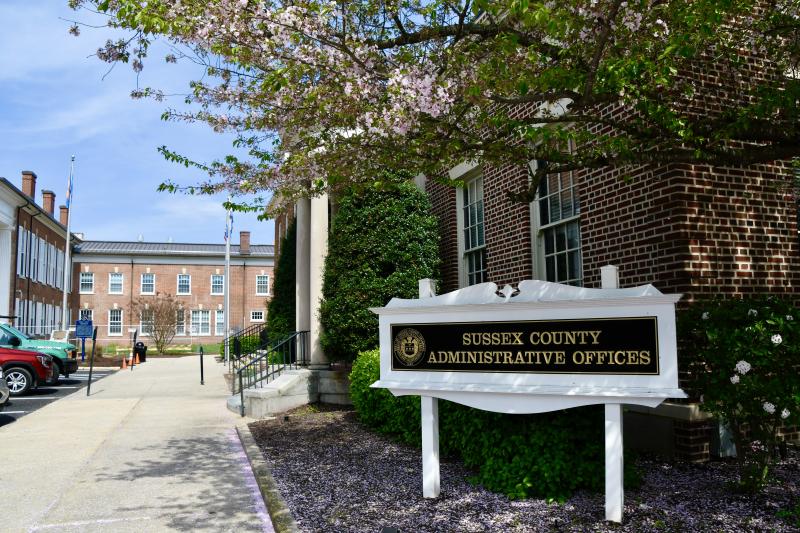A nearly $285 million draft budget reviewed May 6 by Sussex County Council includes a 7.2% hike in spending but no increase in the property tax rate.
The budget total includes the general fund, capital projects, water and sewer funds, pension and American Rescue Plan Act expenditures.
The countywide update of the assessments completed this year for nearly 200,000 parcels significantly changed the values of properties. Council has committed to not raise more money through taxes in its next budget, so the assessment update is revenue neutral.
Tax revenue is up $614,000, or 3.2%, due to new property improvements.
Representatives of county departments explained their budget requests and outlined recently completed and planned projects during the five-hour workshop at the county public safety building in Georgetown.
County Finance Director Gina Jennings said budget increases generally were in line with inflation.
Jennings noted the county relies heavily on realty transfer tax revenue to fund the budget. It is earmarked for public safety, economic development and assessment costs. Thirty-six percent, or $37 million, of the $102,117,374 in general fund revenue is expected to come from the county’s share of the 4% tax paid by homebuyers. By contrast, property taxes would raise 23% of the general fund revenue.
Jennings said she is confident in her realty transfer tax estimate, but she also projected decreasing revenue in coming years, and an increasing reliance on reserve funds to compensate. The county would burn through its reserves by 2035, a year after falling to a dangerously low reserves level and risking a downgrade to its bond rating, she projected.
“I don’t want the council to rely on a volatile revenue base,” she said. “It scares me to no end. I was here when [the reserve] was $13 million.”
Councilman John Rieley said Jennings uses conservative revenue projections, and he’s confident the county’s financial position will remain stable.
Sussex County has been the fastest-growing county in the state for years, and other projections call for the growth to continue for the foreseeable future.
“Do you really want to make the argument that we should raise taxes while we’re sitting on $100 million reserves?” Rieley asked.
Councilwoman Jane Gruenebaum urged her fellow council members to begin looking to address trends raised by Jennings soon, rather than waiting.
Relying on transfer tax encourages housing development that has contributed to pressure on roads, schools, healthcare providers and the environment, Gruenebaum said.
“I was elected to try to get development under control,” she said. “Use of the realty tax is sort of the ‘build, baby, build’ kind of philosophy. The more you build, the more we rely on the transfer tax, the less we have to raise taxes. You want the taxes low, but you don’t want development; those are in direct opposition to one another.”
Councilman Steve McCarron recommended using realty transfer tax revenue for one-time purchases and not for relatively fixed costs, like payroll. McCarron suggested spending $10 million for farmland preservation and building parks.
“We’re paying things that we need to pay every single day, no matter what, with money that is inconsistent,” McCarron said. “We’re artificially keeping the tax rate low but not really spending the bonus money in areas that will save us money in the future.”
The budget draft continues county funding for farmland and open space preservation.
Councilman Matt Lloyd recommended more emphasis be placed on farmland preservation, as this supports jobs and an important local industry.
Complicating the budget process this year is uncertainty over how much the county needs to pay for fire and emergency medical services. A long-awaited, state-mandated review of EMS funding is months late in being completed, but it is expected to recommend more funding.
Council members said May 6 they had not yet received budget requests from fire officials, and council members are reluctant to estimate without a recommendation. The county budget would have to be revised if figures are not available in time.
Council reviewed tentative budget figures prepared by the finance team with information provided by department directors and any known council priorities. Jennings said she will make adjustments based on suggestions of council at the workshop or afterward.
A proposed budget is expected to be submitted to council and the public about the third week of this month, with a public hearing usually held about the third week of June. Council may amend the proposed budget, adopt it or send it back for more work. The deadline to approve a budget is June 30. The fiscal year begins July 1.
Kevin Conlon came to the Cape Gazette with nearly 40 years of newspaper experience since graduating from St. Bonaventure University in New York with a bachelor's degree in mass communication. He reports on Sussex County government and other assignments as needed.
His career spans working as a reporter and editor at daily newspapers in upstate New York, including The Daily Gazette in Schenectady. He comes to the Cape Gazette from the Cortland Standard, where he was an editor for more than 25 years, and in recent years also contributed as a columnist and opinion page writer. He and his staff won regional and state writing awards.
Conlon was relocating to Lewes when he came across an advertisement for a reporter job at the Cape Gazette, and the decision to pursue it paid off. His new position gives him an opportunity to stay in a career that he loves, covering local news for an independently owned newspaper.
Conlon is the father of seven children and grandfather to two young boys. In his spare time, he trains for and competes in triathlons and other races. Now settling into the Cape Region, he is searching out hilly trails and roads with wide shoulders. He is a fan of St. Bonaventure sports, especially rugby and basketball, as well as following the Mets, Steelers and Celtics.






















































